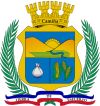Chiapa (Chile) facts for kids
Quick facts for kids
Chiapa
|
||
|---|---|---|
|
Town
|
||
| Chiapa | ||
|
||
| Country | Chile | |
| Region | Tarapacá Region | |
| Province | El Tamarugal | |
Chiapa is a small town in Chile. Its name comes from the Aymara language, meaning "furrow" or "gap." It is located in the Tarapacá Region, in an area called the Precordillera. This means it's high up in the mountains, about 3,200 meters (over 10,000 feet) above sea level!
Most people living in Chiapa are descendants of the Aymara people. Some families also have roots that link them to the Quechua people. However, experts believe there weren't many Quechua-speaking groups in this specific valley when the Spanish first arrived.
Chiapa is part of a special cultural area with two other towns, Illalla and Jaiña. They all share an old irrigation system that has been used since ancient times. The town is also located inside the beautiful Volcán Isluga National Park.
History of Chiapa
People have lived in the Chiapa Valley for a very long time. You can still see old ruins on the hills around the town from ancient times.
When the Spanish came to Chile, Chiapa was likely under the rule of a leader named Juan García Chuquichambi. He might have been from a group called the Caranga. Chiapa was part of a large area controlled by the Caranga, whose main town was Hatun Caranga.
Spanish Rule
In 1540, Chiapa became part of a system called the encomienda of Tarapacá. This system gave Spanish leaders control over groups of native people. The Spanish tried to gather people from different parts of the valley into towns.
Later, between 1780 and 1783, there was a big rebellion against Spanish rule called the Tupac Amaru II Rebellion. During this time, Chiapa was controlled by the rebels. Their leader was Romualdo Pacivilca Callisaya, who worked with other rebel groups nearby.
After Independence
For a while, Chiapa was part of Peru. It was even the capital of its own district within the Tarapacá region. But after the War of the Pacific, a conflict that ended in 1885, Chiapa became part of Chile because of a peace agreement called the Treaty of Ancón.
When the Tarapacá region was created in Chile, Chiapa became part of the Arma District. During a time when a valuable mineral called nitrate was mined, Chiapa became a very important trading center. Many people from different countries came to live and work there.
Chiapa played a key role in supplying goods to the Negreiros area, which was a mining center. It connected the high mountain areas with the coastal regions, making it a busy place for trade.
See also
 In Spanish: Chiapa para niños
In Spanish: Chiapa para niños


